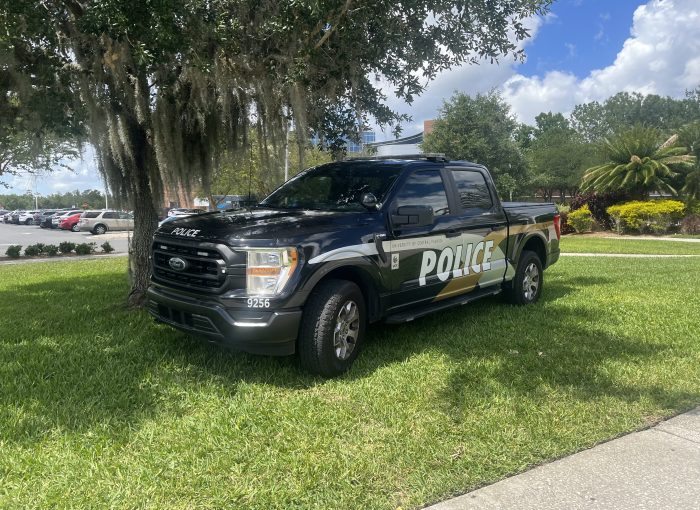by Raiya Shaw
On February 13, 2023, a gunman entered two academic buildings located at Michigan State University’s East Lansing campus and killed three students. Five other students were injured, and the gunman died from a self-inflicted bullet wound shortly after the shootings. The most disturbing thing to me about this 43-year-old man named Anthony McRae was he was not affiliated with the university in any way.
After learning about the shooting, my sense of safety on UCF’s campus instantly dwindled. As a freshman, I believed that once I began college, worrying about gun violence in schools would become a thing of the past since I usually only saw reported school shootings happening in elementary, middle, or high schools. Those tragedies, along with the countless typical woes and dramas of adolescence, were supposed to be left behind. I realized that gun violence is prominent across all levels of education and that the threat does not simply vanish. Curious to hear how UCF’s student body reacted to the news of the shooting, I decided to interview several students about their sense of security on campus. I interviewed twelve undergraduate students majoring in different areas: Computer Science, Film, Health Sciences, Cyber Security, Chemistry, Architecture, English, Psychology, and Early Childhood Education. Despite the wide variation, a pattern was clear: all students shared the common goal of learning and expanding their diverse passions in a safe setting here at UCF.
All responses indicated a shift in feelings of safety and were strangely unanimous. When asked about their initial reaction to MSU’s shooting, all students reported feeling saddened but at the same desensitized to the violence they have been watching since they were in middle school. “Honestly, I wasn’t surprised,” sophomore Roxana Margelu says. Others similarly voiced frustration, terror, and empathy for the affected Michigan State students.
“It’s not really shocking anymore, at this point. It’s already the beginning of March, and I think over ninety shootings have occurred so far.”- UCF sophomore Roxana Margelu
Additionally, a majority of individuals cited the location of a college campus as the main reason why the MSU shooting has altered their opinions on campus safety. “Before, I hadn’t fully put into perspective how any dude could just walk onto campus and do whatever he wanted, because it is technically a public area. People come here to visit their kids, and just as easily as a parent could come to visit their child, a random guy could come on campus,” freshman Ryan Lynch says. “I go out a lot, so if something happened, there’s a good chance that I wouldn’t be in the safety of my dorm. If that happened in high school and you were in the hallways, a teacher would pull you into their classroom. Here, if I crossed paths with that dude outside, I wouldn’t be able to do anything. It’s a little scary to think about.”
Lynch’s fear and comparison of college and high school safety protocols was a sentiment expressed by many, with student Jack Hall even claiming, “That strengthened sense of danger has made me realize that I don’t even know what the measures are to protect us against school shootings here.” These remarks are coming from a generation that is becoming more and more accustomed to such threats as they grow older, and find that the issue has yet to be resolved. Since the 1970s, there have been thousands of mass shootings reported in elementary, middle, and high schools. On the other hand, there have only been twelve reported mass shootings on college campuses in the United States since 1966, two of which have occurred in the last five months. The rise in college and university gun violence is undeniable.
“It feels like it’s just following us now: this has been happening since we were small. We will never not have to worry about it.”- UCF freshman Sofia
Only two students out of the twelve I interviewed stated that UCF’s abundant resources made them feel absolutely secure on campus. I received mixed responses when I asked if they felt safe on the UCF main campus; some students said that UCF’s large population and various open areas made them feel more secure, while others said those aspects of UCF achieved the opposite effect and actually made them feel more vulnerable. Some students felt a mixture of both, with freshman Daniel stating that, “For the most part, I’ve always felt safe on UCF’s campus, and I think they do a decent job at creating that environment- but the openness of certain parts of campus has made me feel unsafe at times.”
For those who feel like they will never be able to escape gun violence as they pursue an education, this all seems pretty hopeless, so the big question is: what are some possible solutions? While some students commended UCF for having a police department on campus and said that its presence made them feel at ease, many wished that there was more patrolling. “There are a lot of police usually for big events, but not for normal campus operations,” says UCF student Nicole. Freshman Anthony Fernandez also expressed a similar opinion, stating, “I actually don’t often see the police. But I think just having them around more often would be effective, and also wouldn’t disrupt anyone.”
The other top answer reported by UCF students was using ID cards to enter academic buildings. At the moment, UCF students can use their ID cards to enter dorm rooms and dorm buildings, but eight out of the twelve students I interviewed stated that they would feel safer if their ID cards were utilized for academic buildings as well. “If we already use our IDs to get into our dorm rooms, why not use them for classroom buildings too?” says UCF freshman Paula.
What surprised me the most about these interviews was how consistent the responses were. The students I spoke with seemed so unfazed by the violence and simply accepted the threat that has been lurking over their shoulders for the past couple of decades. The Michigan State University shooting served as a “wake-up call” for many students and made one thing evident: gun violence in schools will always impact the lives of American students, and will continue to shift students’ perspective on personal safety until something is done to prevent these mass shootings from ever happening again. Colleges and universities across the country can start by listening to what their student bodies have to say about gun violence. American students are tired of mass shootings hindering their education.




